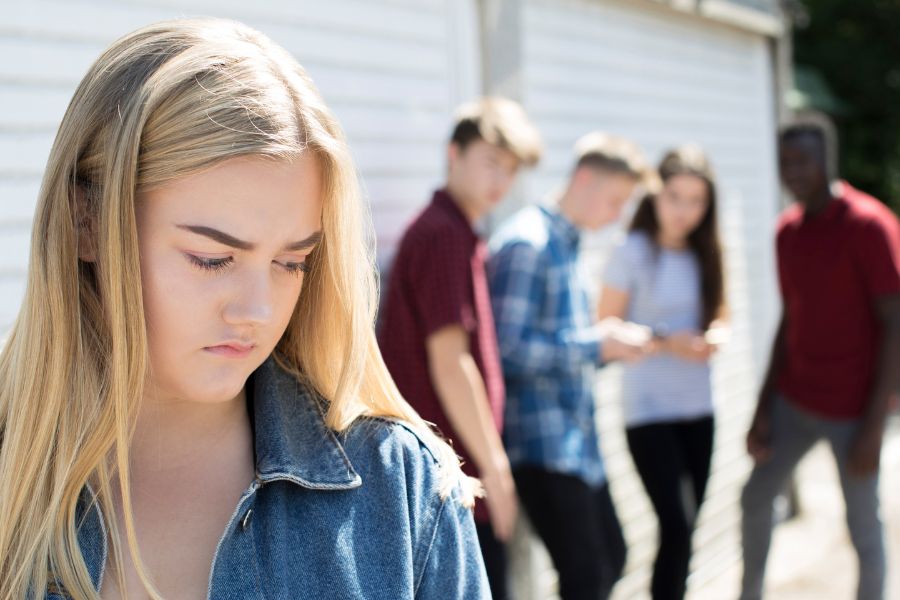Teens spend most of their waking hours surrounded by their peers, so it’s no surprise that feeling liked and accepted by other teenagers ranks high on most teens’ priority lists. While friendship and community are essential elements for teenage happiness, seeking peer approval can have its downsides — like when peer pressure leads to teen drug abuse.
Parents can help protect their teenagers from the risk of drug abuse by speaking with their teens about dealing with peer pressure and getting professional help when a teen’s choices lead to drug use.
Teens and Peer Pressure
It’s no secret that people often take on the values, attitudes, and habits of those they spend the most time with. Children and teens learn the rules of social engagement by interacting with their peers.1 That can have many positive effects; friends who are kind or prioritize academic success can impart those values to your child.
Teenage peer pressure becomes an issue when a teen’s friends engage in actions or carry attitudes that are at odds with what you hope to see in your child. Even worse, peers might lead a teen to engage in illegal or dangerous activities, like experimenting with drugs.
The Different Types of Peer Pressure
Peer pressure can be positive. Positive peer pressure happens when peers influence a teen to engage in the types of attitudes or actions that parents hope to see. A teen can be positively influenced by friends who volunteer, value honesty, support one another, and work hard in school.
On the other hand, negative peer pressure is peer influence that has unwanted or unhealthy effects on a teen. Breaking rules, having an apathetic attitude toward grades, and being disrespectful to parents and teachers are all behaviors that are often rooted in negative peer pressure.
Peer pressure can be spoken or unspoken. Sometimes teens are directly called out by their friends or challenged to act a certain way, like helping a friend cheat on a test. Other times, a teen simply follows the example their friends set because they want to feel accepted.
How Peer Pressure Leads to Drug Abuse
When a teen is overly concerned about gaining the acceptance of their peers, they’re more likely to engage in the behaviors their friends expect — even when they know they shouldn’t.
Most teens don’t just wake up one day and decide to try drugs. Instead, teen drug abuse is usually the result of peer pressure.
When a teen hangs out with friends or attends a party, it’s not uncommon for someone to produce drugs or alcohol. Peers might openly tease a teen, accuse them of being scared, or tell them they’re not cool if they don’t engage. A teen might worry that if they don’t participate in drug use, they’ll be rejected by their friends and left out of future social plans.
Helping Your Teen Handle Peer Pressure
There’s good news for parents: What you have to say about peer pressure and drug abuse matters greatly. The National Institute on Drug Abuse reports that parents are the single biggest factor when it comes to teens resisting peer pressure and staying away from drugs.2
Parents who work to build strong relationships and proactively discuss drugs and peer pressure with their teens are giving them the tools they need to make smart choices and prioritize their well-being over the opinions of their peers.
Talk to your teen about the risks of drug use, and discuss how they might react if a friend offers them drugs.3 When teenagers discuss and plan for such a situation in advance, they’ll be ready when it happens. Instead of being caught off guard, they’ll know what to say.
You want your teen to understand that their health and happiness are more important than feeling accepted by peers who aren’t making good choices.
Getting Help for Teen Drug Abuse
Drug use can be very difficult to stop. If your teen is already using drugs, they need professional support. Ember Recovery is a teen substance use treatment center. We offer inpatient drug abuse treatment designed specifically for teens.
Our programs help teens understand why they started using drugs, promote better mental and emotional health, and teach skills for staying away from drugs for good.
If your teen is using drugs, Ember Recovery is here for you. Contact us today to learn more about getting help for teen drug abuse.
Sources:
[1] https://newsinhealth.nih.gov/2021/09/power-peers [2] https://nida.nih.gov/sites/default/files/PODAT-InBrief-Preventing-Drug-Use-Child-Adolescents-FINAL-cover.pdf [3] https://www.mayoclinic.org/healthy-lifestyle/tween-and-teen-health/in-depth/teen-drug-abuse/art-20045921
Andrea Dickerson is a Licensed Therapist and Certified Substance Use Counselor who has worked in behavioral health since 1997. Currently, Andrea is the Director of Behavioral Health, overseeing the Ember residential treatment programs and YSS outpatient counseling clinics throughout Central and North Central Iowa. She became a Motivational Interviewing (MI) trainer in 2006 and provides MI trainings throughout Iowa.
Andrea specializes in working with adolescents and their families and enjoys seeing the family relationships grow through therapy. Andrea is also a CARF International Surveyor, going around North America ensuring behavioral health organizations are meeting required standards.
In her free time, Andrea enjoys cheering on the Iowa Hawkeyes and Chicago Cubs, as well as being an active member of Soroptimist International of the Americas (SIA), a global organization that provides women and girls with access to the education and training they need to achieve economic empowerment. She has been a member of the SI of Des Moines club since 2012 and has been actively involved at the regional level, currently serving as Co-Governor of the Peaks to Plains Region.
Through her involvement in SIA, Andrea has been actively involved in the Dream Programs, coordinating annual Dream It, Be It: Career Support for Girls projects, which give girls the tools they need to achieve their education and career goals, empowering them to break cycles of poverty, violence, and abuse.
